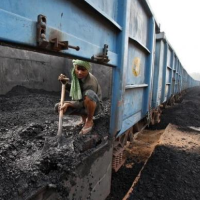Supreme Court Scraps Coal Blocks for ‘Illegal’ Allocation
 A worker unloads coal from a freight train (file photo: Reuters)
A worker unloads coal from a freight train (file photo: Reuters)
The Supreme Court has scrapped 214 of the 218 coal blocks allocated by different administrations over the past two decades, in a tough ruling that hit the shares of companies that invested in the blocks.
In a landmark verdict in August, the Supreme Court had declared ‘illegal” all coal blocks allocated between 1993 and 2010, ruling that this was done in an unfair, arbitrary and non-transparent manner without following any objective criteria.
On Wednesday, the court scrapped almost all the coal blocks allocated. It let off two coal blocks operated by Reliance Power and one each by state firms NTPC and Steel Authority of India, as some of these are developing mega power projects critical for the country.
"The ruling is more severe than the industry was hoping but it sends a clear message about India taking a stand against the improper allocation of national resources and in favour of improving transparency and good governance," Sushil Jacob, a lawyer at London law firm Linklaters, told Reuters.
The power, steel and cement companies that won the 214 blocks will have until March 31, 2015 to return them. The government can then auction them off, government lawyer Mukul Rohatgi told reporters.
Currently, about 42 blocks are producing 53 million tonnes of coal that account for 10 per cent of the total coal supplied in India.
"This judgment will lead to serious supply disruptions as mining from these blocks will be hampered, further exacerbating the coal shortages in the country. Any disruption in the coal supplies will accentuate power crisis and force higher imports impacting the current account deficit," said Ajay Shriram, president of the Confederation of Indian Industry (CII).
According to CII, acute fuel shortages are already impacting the power sector, and currently almost 80 million tonnes of coal is being imported to meet the sector's requirements. India has the dubious distinction of being the world's no. 3 importer, though it possesses the fifth biggest reserves of coal.
Meanwhile, the stock of state mining company Coal India rose 5 per cent to Rs. 351.35 on the Bombay Stock Exchange. Most analysts believe the Supreme Court’s ruling will benefit Coal India as the companies whose coal licences have been cancelled will have to buy the fuel from Coal India at market price.
Shares of block holders, such as Jindal Steel and Power Ltd, Hindalco Industries Ltd, and Tata Power Co Ltd, have fallen as they will not only lose their mines but may also be fined.
Yet there is no mention in the court's ruling of any action to be taken against the previous ministers that allocated the blocks to these companies in the first place. The former government of Manmohan Singh shoulders most of the blame, dogged as it was by accusations of crony capitalism in allocating India's resources, including coal. An audit in 2012 showed that allocating the resources, instead of auctioning them off, had cost the exchequer as much as $33 billion. Yet the previous NDA government of 1998-2004 has also come under a cloud with the court's ruling.
Some experts told Reuters that the scrapping of coal block allocations will help the current NDA administration start with a clean slate and create a robust independent regulator for the sector.
- Karan Singh
To Learn More:
Supreme Court scraps nearly all coal blocks allocated since 1993 (by Suchitra Mohanty and Krishna N Das, Reuters)
Supreme Court ruling on coal blocks likely to hit economy, India Inc says (PTI)
Indian Supreme Court cancels 214 coal scandal permits (BBC News)
Supreme Court Declares 1993-2010 Coal Allocations ‘Illegal’ (by Karan Singh, AllGov India)
- Top Stories
- Controversies
- Where is the Money Going?
- India and the World
- Appointments and Resignations
- Unusual News
- Latest News
- India College Chain’s Expansion into U.S. Draws Opposition from Massachusetts Officials over Quality of Education
- Milk Shortages in India Tied to Release of New Movies Featuring Nation’s Favorite Stars
- Confusion Swirls around Kashmir Newspaper Ban in Wake of Violent Street Protests
- Polio-Free for 5 Years, India Launches Vaccine Drive after Polio Strain Discovery
- New Aviation Policy Could Increase Service, Lower Ticket Prices






Comments